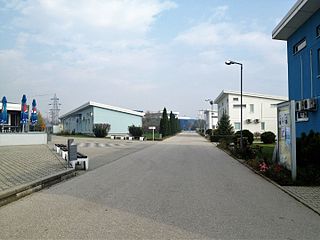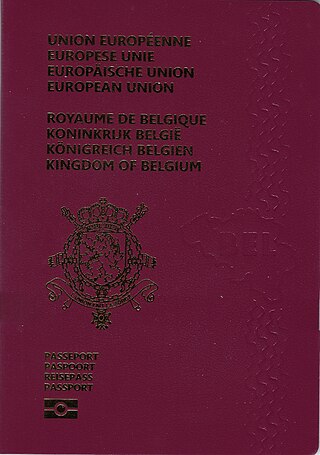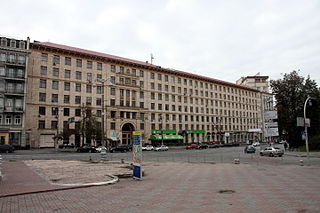In phonetics, the airstream mechanism is the method by which airflow is created in the vocal tract. Along with phonation and articulation, it is one of three main components of speech production. The airstream mechanism is mandatory for most sound production and constitutes the first part of this process, which is called initiation.
The Royal Academies for Science and the Arts of Belgium (RASAB) is a non-governmental association that promotes and organises science and the arts in Belgium by coordinating the national and international activities of its constituent academies such as the National Scientific Committees and the representation of Belgium in international scientific organisations.

South East European University (SEEU), informally also known as the Max van der Stoel University, is an internationally recognized private-public nonprofit higher education institution established in 2001 upon initiative of former Minister of Foreign Affairs of the Netherlands and OSCE High Commissioner on National Minorities HE Max van der Stoel and is located in Tetovo, North Macedonia, with a branch campus in Skopje.

European Union culture policies aim to address and promote the cultural dimension of European integration through relevant legislation and government funding. These policies support the development of cultural activity, education or research conducted by private companies, NGO's and individual initiatives based in the EU working in the fields of cinema and audiovisual, publishing, music and crafts.

Pan-European identity is the sense of personal identification with Europe, in a cultural or political sense. The concept is discussed in the context of European integration, historically in connection with hypothetical proposals, but since the formation of the European Union (EU) in the 1990s increasingly with regard to the project of ever-increasing federalisation of the EU. The model of a "pan-European" union is the Carolingian Empire, which first defined "Europe" as a cultural entity as the areas ruled by the Roman Catholic Church, later known as "Medieval Western Christendom". The original proposal for a Paneuropean Union was made in 1922 by Count Richard von Coudenhove-Kalergi, who defined the term "pan-European" as referring to this historical sense of the western and central parts of continental Europe encompassing the cultures that evolved from medieval Western Christendom instead of the modern geographic definition of the continent of Europe. Coudenhove-Kalergi saw the pan-European state as a future "fifth great power", in explicit opposition to the Soviet Union, "Asia", Great Britain and the United States.
Language localisation is the process of adapting a product's translation to a specific country or region. It is the second phase of a larger process of product translation and cultural adaptation to account for differences in distinct markets, a process known as internationalisation and localisation.

The European Day of Languages is observed on 26 September, as proclaimed by the Council of Europe on 6 December 2001, at the end of the European Year of Languages (2001), which had been jointly organised by the Council of Europe and the European Union. Its aim is to encourage language learning across Europe.

The European University Institute (EUI) is an international postgraduate and post-doctoral research-intensive university and an intergovernmental organisation with juridical personality, established by its founding member states to contribute to cultural and scientific development in the social sciences, in a European perspective. Its main campus is located in the hills above Florence in Fiesole, Italy.

Leonard Orban is a Romanian independent technocrat who served as the Commissioner for Multilingualism in the European Commission, the executive body of the European Union (EU). He was responsible for the EU language policy and was the first Romanian Commissioner and the first member of the Commission whose portfolio is exclusively multilingualism. His term of office began on 1 January 2007 and ended on 9 February 2010. With a background in engineering and economics, Orban has taken up various posts working for the accession of Romania to the European Union, most prominently as Deputy and later as Chief Negotiator for his country at the time of final negotiations with the European Union.

Languages of Montenegro are languages that are spoken in Montenegro. According to the Constitution of Montenegro, adopted in 2007, Montenegro has only one official language, specified as Montenegrin. The Montenegrin language is written in the Latin and Cyrillic alphabets, but there is a growing political movement to use only the Latin alphabet.

A Belgian passport is a travel document issued by Belgium to Belgian citizens to facilitate international travel. It grants the bearer international passage in accordance with visa requirements and serves as proof of citizenship.
Weidner Communications Inc. was founded by Stephen Weidner in 1977 and marketed the Weidner Multi-Lingual Word Processing System.

The Hungarians in Ukraine number 156,600 people according to the Ukrainian census of 2001 and are the third largest national minority in the country. Hungarians are largely concentrated in the Zakarpattia Oblast, where they form the largest minority at 12.1% of the population. In the area along the Ukrainian border with Hungary, Hungarians form the majority.
The Commission for the Management and Application of Geoscience Information (CGI), usually referred to by the unofficial "Commission for Geoscience Information" is subcommittee grade scientific organization that concerns itself with geological standard, information management and interoperability matters on a global scale.

Hunor Kelemen is a Romanian politician and Hungarian language writer. The current president of the Democratic Alliance of Hungarians in Romania (UDMR), he has been a member of the Romanian Chamber of Deputies since 2000, and was nominated as his party's candidate for the 2009, 2014, and 2019 presidential elections. From December 2009 to May 2012 he was Romania's Minister of Culture in the Emil Boc and Mihai Răzvan Ungureanu governments, a role he has reprised between March and October 2014 in the government headed by Victor Ponta. In 2020, he was re-elected as a member of parliament and became the deputy prime minister of Romania.

Beschermd erfgoed is the official term to describe Flemish National Heritage Sites listed by law to protect and spread awareness of Belgian cultural heritage, specifically in Flanders. The term is also used nationwide to refer to national heritage sites. Because Belgium is officially a tri-lingual country, the other nationwide terms used in the rest of the country are the French term Bien classé and the German term Kulturdenkmal.

The Institute for the Ukrainian Language of the NAS of Ukraine is a research organization in Ukraine created to do thorough studying of the Ukrainian language. It is the Ukrainian coordinating center of research issues in the Ukrainian language. An activity of importance to the Institute is to consolidate the Ukrainian language as the official language in the lingual space of Ukraine, to reach the lingual harmony in the life of present-day civil society.

The Internet Memory Foundation was a non-profit foundation whose purpose was archiving content of the World Wide Web. It hosted projects and research that included the preservation and protection of digital media content in various forms to form a digital library of cultural content. As of August 2018, it is defunct.
The Association of Translation Companies (ATC) is a professional membership association promoting language services in the United Kingdom and beyond. The ATC represents the interests of translation companies operating in the UK's expanding language services industry which is home to over 1,200 translation companies, is worth more than £1 billion and employs more than 12,000 people.

The Panhellenic Federation of Cultural Associations of Vlachs is an organization of Aromanians ("Vlachs") in Greece. The Aromanians are an ethnic group scattered over the Balkans living in many countries such as Albania, Bulgaria, North Macedonia, Romania and Serbia, as well as Greece, which has the largest concentration of them. The Aromanians of Greece are characterized by their disinterest in initiatives that aim to maintain the Aromanian culture and language outside the familiar environment and many have repeatedly expressed opposition to foreign organizations that have tried to help them achieve this.














